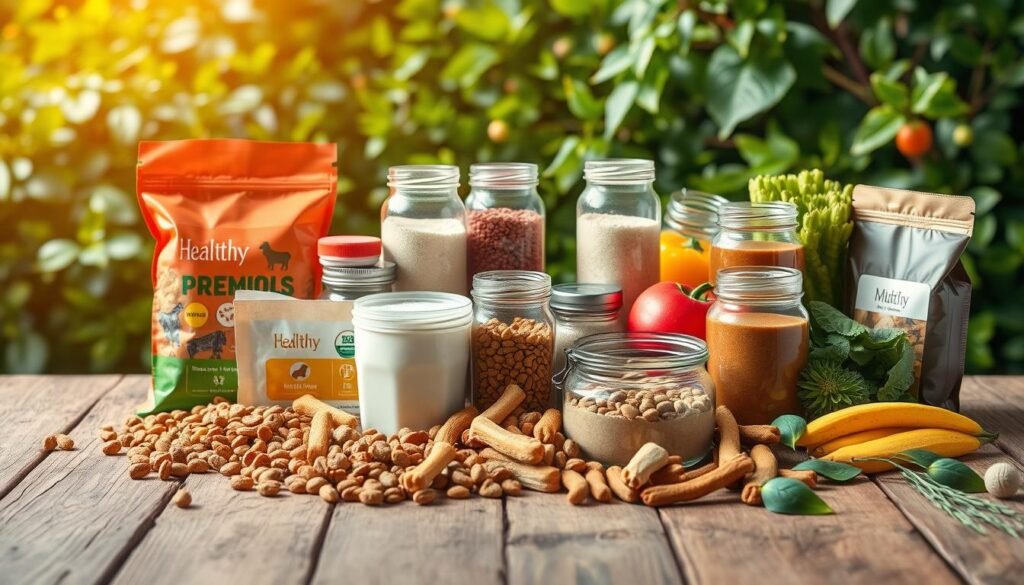Did you know that a staggering 1 in 5 pets in the United States suffers from some form of diet-related health issue? At Nourish Your Pets, we understand the importance of providing your furry companion with the best nutrition possible to prevent such problems. A well-balanced diet is crucial for maintaining your pet’s overall health and wellbeing.
Nourishing your companion with the right food can help prevent various health issues, including obesity, joint disease, and heart disease. By making informed decisions about your pet’s diet, you can significantly enhance their quality of life.
Key Takeaways
- Understanding the basics of pet nutrition is crucial.
- A balanced diet can prevent various health issues.
- Key nutrients are essential for dogs and cats.
- Choosing the right pet food is vital.
- A well-nourished pet leads a healthier life.
Understanding the Basics of Pet Nutrition
Good nutrition is the cornerstone of a long and healthy life for your pet. Understanding the basics of pet nutrition is essential for providing your pet with the nutrients they need to thrive.
What is Pet Nutrition?
Pet nutrition refers to the process of providing your pet with the necessary nutrients, vitamins, and minerals to maintain their overall health. This includes understanding the different types of nutrients and how they contribute to your pet’s wellbeing.
Importance of a Balanced Diet
A balanced diet is critical for maintaining your pet’s health. It ensures they receive the right amount of nutrients to support their bodily functions, energy needs, and overall health.
A balanced diet for pets typically includes a mix of proteins, fats, carbohydrates, vitamins, and minerals. The specific needs can vary based on factors like age, breed, and health conditions.
Common Nutritional Needs by Pet Type
Different pets have different nutritional needs. For example, dogs are omnivores and require a diet that includes both animal and plant-based ingredients, while cats are obligate carnivores and need a diet rich in animal-based proteins.
| Pet Type | Dietary Needs | Key Nutrients |
|---|---|---|
| Dogs | Omnivorous | Proteins, Fats, Carbohydrates, Vitamins, Minerals |
| Cats | Carnivorous | High-quality Animal Proteins, Taurine, Vitamins A, D, E |
Key Nutrients for Dogs
Understanding the nutritional needs of dogs is essential for pet owners who want to ensure their furry friends lead healthy lives. Dogs require a specific balance of nutrients to maintain their overall health, and this includes proteins, fats, vitamins, and minerals.
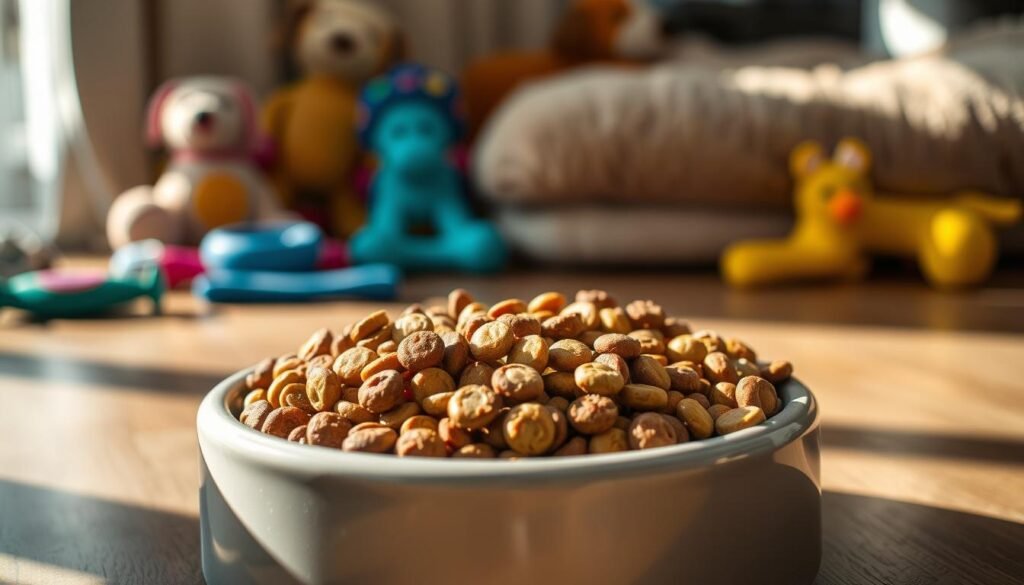
Proteins and Their Benefits
Proteins are a crucial component of a dog’s diet, providing the building blocks for muscles, skin, and hair. High-quality protein sources include chicken, salmon, and lamb. “A diet rich in protein can help support a dog’s overall health, from maintaining healthy muscles to supporting a shiny coat,” says a leading canine nutritionist. It’s essential to choose dog food that lists a named protein source as its first ingredient.
Proteins also play a vital role in maintaining a dog’s immune system. A deficiency in protein can lead to a range of health issues, including skin problems and a weakened immune response. Therefore, ensuring adequate protein intake is vital for maintaining a dog’s overall wellbeing.
Essential Fats for Canine Health
Fats are another critical nutrient for dogs, providing energy and supporting the absorption of vitamins. Omega-3 and Omega-6 fatty acids are particularly important, supporting skin health, reducing inflammation, and promoting a healthy coat. Sources of these essential fats include fish oil and flaxseed.
In addition to supporting skin and coat health, fats are also crucial for brain function and development. A balanced intake of essential fats can help support a dog’s cognitive health and may even help reduce the risk of certain health conditions.
Vitamins and Minerals Needed
Vitamins and minerals play a vital role in a dog’s diet, supporting a range of bodily functions from energy production to immune function. Vitamin D, for example, is crucial for bone health, while calcium and phosphorus are essential for maintaining strong bones and teeth.
Our supplements make it easy and enjoyable for you to ensure your dog is getting all the nutrients they need, without any guesswork. By understanding the key nutrients required by dogs and choosing high-quality dog food, pet owners can help support their dog’s overall health and wellbeing.
Key Nutrients for Cats
Cats have unique dietary needs that are essential for their health and longevity. As obligate carnivores, they require a diet rich in protein from animal sources. Understanding these nutritional needs is crucial for providing a healthy pet diet that supports their overall well-being.
Importance of Animal-Based Proteins
Animal-based proteins are fundamental to a cat’s diet. They provide essential amino acids like taurine and arachidonic acid, which are vital for heart health, vision, and reproduction. A diet lacking in these proteins can lead to serious health issues. A pet nutritionist would recommend high-quality protein sources such as chicken, salmon, or beef as the main ingredient in cat food.
Fats and Their Effects on Feline Health
Fats are another critical component of a cat’s diet, providing energy and supporting skin and coat health. Omega-3 and omega-6 fatty acids are particularly important, with sources like fish oil being highly beneficial. However, it’s crucial to maintain a balanced ratio to avoid health issues.
The Role of Taurine in Cat Diets
Taurine is an essential amino acid found in animal-based proteins. It’s critical for heart health and vision in cats. Unlike dogs, cats cannot synthesize enough taurine on their own, making dietary intake vital. Ensuring adequate taurine in a cat’s diet is a key aspect of maintaining a healthy pet diet.
Choosing Quality Pet Food
Understanding what goes into your pet’s food is essential for their health. With so many options available, selecting the right pet food can be overwhelming. However, by knowing what to look for, you can make an informed decision that benefits your pet’s overall wellbeing.
Reading Pet Food Labels
The first step in choosing quality pet food is to read the labels carefully. Pet food labels provide crucial information about the ingredients, nutritional content, and manufacturer. Look for labels that clearly state the ingredients and their quantities. Be wary of vague terms or fillers that offer little nutritional value.
- Check for the manufacturer’s name and contact information.
- Look for a clear list of ingredients.
- Ensure the label complies with AAFCO or NRC standards.
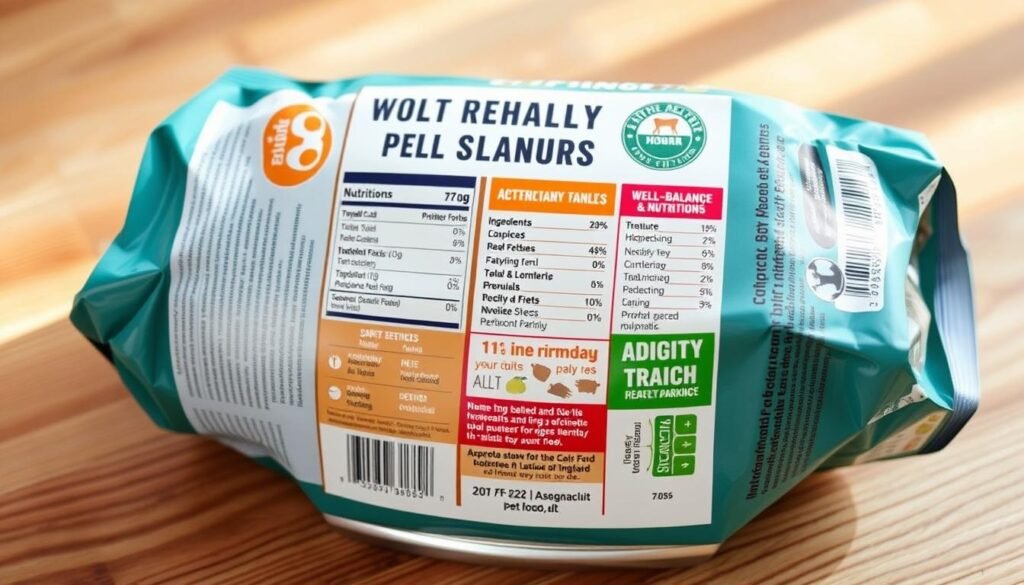
Understanding Ingredients and Their Benefits
Once you’ve identified a pet food with a clear label, the next step is to understand the ingredients and their benefits. High-quality pet food should contain named protein sources (like chicken or salmon), whole grains, and a mix of fruits and vegetables. Avoid foods with generic terms like “meat” or “by-products.”
Key Ingredients to Look For:
- Named Protein Sources: Chicken, beef, or fish.
- Whole Grains: Brown rice, oats, or barley.
- Fruits and Vegetables: Carrots, apples, or sweet potatoes.
Recognizing Trusted Brands
Finally, it’s essential to recognize trusted brands in the pet food industry. Brands that invest in research and adhere to high manufacturing standards are more likely to produce quality pet food. Look for brands that are transparent about their ingredients and manufacturing processes.
Some characteristics of trusted brands include:
- Transparency about their ingredients and manufacturing.
- Adherence to high nutritional standards.
- Positive reviews and recommendations from veterinarians or pet nutritionists.
By following these guidelines, you can choose a pet food that meets your pet’s nutritional needs, supporting their overall health and wellbeing.
Homemade vs. Commercial Pet Food
The choice between preparing homemade meals for pets and buying commercial pet food is significant. Pet owners must consider several factors, including their pet’s nutritional needs, their own lifestyle, and the potential benefits and drawbacks of each option.
Benefits of Homemade Pet Nutrition
Preparing homemade meals for pets allows owners to have complete control over the ingredients, ensuring that their pets receive a balanced diet tailored to their specific needs. This can be particularly beneficial for pets with food allergies or sensitivities.
Homemade pet nutrition also enables owners to avoid preservatives and additives commonly found in commercial pet foods, potentially improving their pet’s overall health and well-being.
Safety Considerations for Homemade Diets
While homemade pet nutrition offers several benefits, it’s crucial to ensure that the diet is nutritionally balanced. Pets require specific vitamins, minerals, and nutrients, and a deficiency can lead to health issues.
Consulting with a veterinarian or a pet nutritionist is essential to formulate a homemade diet that meets all the nutritional needs of pets.
When to Choose Commercial Options
Commercial pet foods are convenient and formulated to provide a complete and balanced diet. They are a good option for pet owners who have busy lifestyles or are unsure about how to prepare a nutritionally balanced homemade diet.
It’s essential to choose a high-quality commercial pet food that is appropriate for your pet’s life stage and lifestyle. Reading labels carefully and understanding the ingredients can help pet owners make an informed decision.
Special Dietary Needs for Pets
Understanding the special dietary needs of pets is crucial for their overall health. As pets age or have specific health conditions, their nutritional requirements change. More than 50% of pets are obese, leading to various health issues, including behavioral problems, joint disease, skin disease, and heart disease.
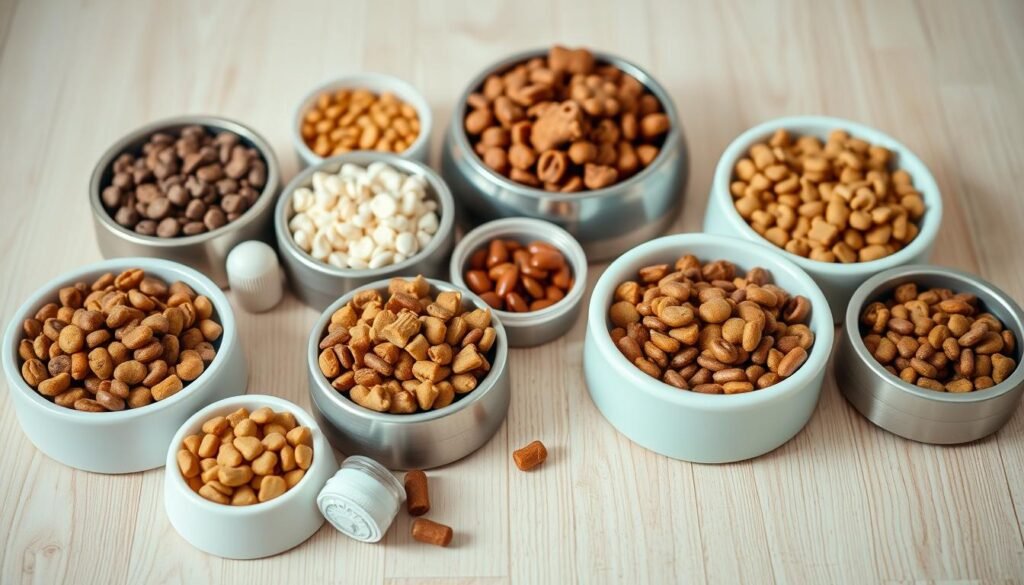
Dietary Concerns for Older Pets
As pets age, their metabolism slows down, and their energy needs decrease. Older pets require fewer calories, but their need for essential nutrients like proteins, vitamins, and minerals remains high or even increases. “Older pets benefit from diets rich in omega-3 fatty acids, antioxidants, and fiber to support joint health, cognitive function, and digestion,” says a leading veterinarian.
It’s essential to adjust their diet accordingly to prevent obesity and ensure they receive the necessary nutrients. Older pets may also have specific health issues, such as kidney disease or arthritis, which require tailored nutritional approaches.
Food Allergies and Sensitivities
Some pets develop allergies or sensitivities to certain ingredients in their food, leading to skin issues, digestive problems, or ear infections. Common allergens include beef, dairy, and soy. Identifying and avoiding these allergens is crucial for managing food allergies.
A pet owner noted, “After switching to a hypoallergenic diet, my dog’s skin issues cleared up significantly.” Such testimonials highlight the importance of recognizing and addressing food allergies and sensitivities.
Tailoring Nutrition for Special Breeds
Different breeds have unique nutritional needs based on their size, coat type, and predisposed health conditions. For example, large breeds like Great Danes require diets that support joint health, while breeds like Bulldogs, with their sensitive skin, may benefit from diets rich in omega-3 fatty acids.
Tailoring nutrition to the specific needs of your pet’s breed can help prevent breed-specific health issues and ensure they lead a healthy life.
In conclusion, understanding and addressing the special dietary needs of pets is vital for their health and wellbeing. Whether it’s adjusting for age, managing allergies, or catering to breed-specific needs, the right nutrition can make a significant difference.
The Role of Supplements in Pet Nutrition
As pet owners, we’re constantly seeking ways to improve our pets’ health, and supplements can play a significant role in their nutritional well-being.
Supplements are designed to complement a pet’s diet, providing essential nutrients that may be lacking. Whether it’s to address a specific health issue or to enhance overall wellness, supplements can be a valuable addition to your pet’s care regimen.
When to Consider Pet Supplements
There are several scenarios where supplements might be necessary. For instance, pets with certain medical conditions or those on restricted diets may require additional nutrients. Consulting with a pet nutritionist can help determine if supplements are right for your pet.
Some common signs that your pet might benefit from supplements include dull coat, lethargy, or digestive issues. If you’re concerned about your pet’s health, it’s always best to consult with a veterinarian.
Types of Supplements Available
The market offers a wide range of supplements for pets, including vitamins, minerals, and probiotics. Probiotics, for example, can help maintain a healthy gut, while omega-3 fatty acids support skin and coat health.
| Supplement Type | Benefits | Common Uses |
|---|---|---|
| Probiotics | Supports gut health | Digestive issues |
| Omega-3 Fatty Acids | Enhances skin and coat health | Skin allergies, dull coat |
| Vitamin E | Antioxidant properties | Overall health, aging pets |
Consultations with Veterinarians
Before adding any supplements to your pet’s diet, it’s crucial to consult with a veterinarian. They can help you determine the best course of action based on your pet’s specific needs and health status.
Our supplements make it easy and enjoyable for you to ensure your dog is getting all the nutrients they need. By working closely with your veterinarian, you can create a healthy pet diet that includes the right supplements for your pet.
Tips for Transitioning Your Pet to New Food
Introducing new food to your pet’s diet should be done gradually to prevent digestive upset. A sudden change in diet can lead to stomach issues, so it’s essential to take a gradual approach when switching to a new pet food.
Signs of Dietary Change in Pets
When changing your pet’s food, it’s crucial to watch for signs of dietary intolerance or sensitivity. These can include vomiting, diarrhea, or lethargy. If you notice any of these symptoms, consult your veterinarian for advice on the best course of action.
Some pets may also exhibit behavioral changes, such as decreased appetite or increased anxiety, when their food is changed. Monitoring these changes can help you identify any issues early on.
Gradual Transition Techniques
To transition your pet to a new food successfully, start by mixing a small amount of the new food with their current diet. Gradually increase the proportion of new food to old over a period of 7-10 days. This allows your pet’s digestive system to adjust to the new ingredients.
- Day 1-2: 25% new food, 75% old food
- Day 3-4: 50% new food, 50% old food
- Day 5-6: 75% new food, 25% old food
- Day 7 and beyond: 100% new food
Monitoring Your Pet’s Health
During the transition period, keep a close eye on your pet’s overall health. Check for any adverse reactions to the new food, such as skin issues or digestive problems. If you notice any concerning symptoms, consult with your veterinarian.
It’s also a good idea to keep a record of your pet’s food intake and any changes in their health or behavior. This can help you identify patterns and make adjustments as needed.
| Transition Day | Old Food Percentage | New Food Percentage |
|---|---|---|
| 1-2 | 75% | 25% |
| 3-4 | 50% | 50% |
| 5-6 | 25% | 75% |
| 7+ | 0% | 100% |
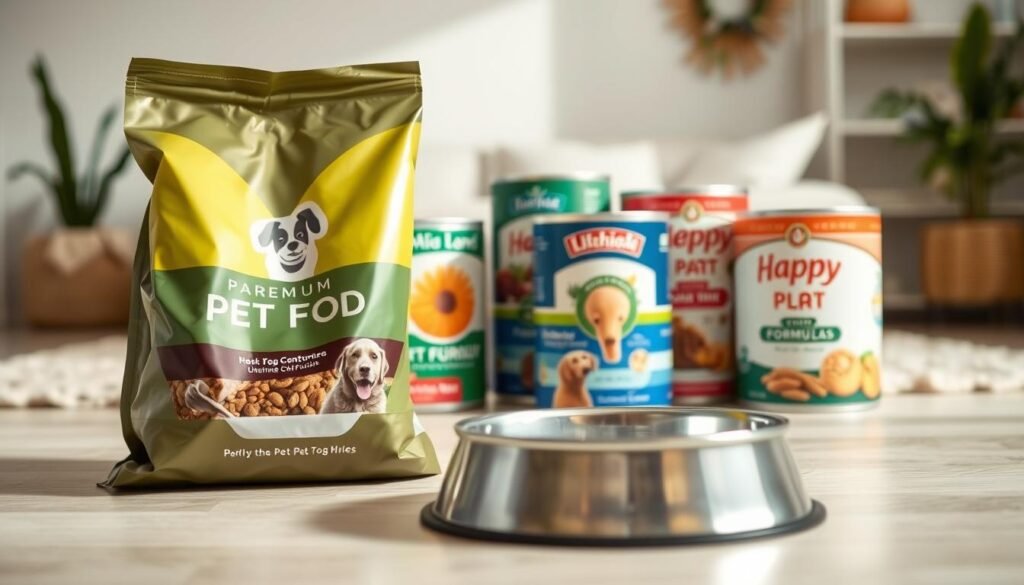
Transitioning your pet to a new food requires patience and attention to detail. By following these tips and consulting with your veterinarian, you can ensure a smooth transition to a new diet that meets your pet’s nutritional needs.
For more information on choosing the best pet food, consider exploring reputable brands that offer high-quality, nutrient-rich formulas. Some of the best pet food brands prioritize natural ingredients and tailored nutrition for different life stages and lifestyles.
Common Myths About Pet Nutrition
You are what you eat, and this saying holds true for pets too. As we’ve explored the various aspects of pet nutrition, it’s clear that misinformation can lead to unhealthy choices for our pets. Many pet owners unknowingly perpetuate common myths about pet nutrition, which can negatively impact their pet’s health.
Separating Facts from Fiction
Some believe that pets require a completely grain-free diet, while others think that a raw diet is the only way to go. However, the truth lies in understanding the nutritional needs of our pets. For instance, Royal Canin’s research has shown that certain breeds have unique dietary requirements. By understanding these needs, we can make informed decisions about our pet’s diet.
Staying Informed About Pet Nutrition
Ongoing education is crucial in ensuring our pets receive the best possible nutrition. By staying up-to-date with the latest research and findings from trusted sources like the American Animal Hospital Association, we can debunk common myths and provide our pets with a balanced and healthy diet, ultimately supporting their overall pet health.
FAQ
What is the importance of a balanced diet for pets?
What are the key nutrients required for canine health?
What are the unique nutritional needs of cats?
How do I choose the right pet food for my pet?
What are the benefits and safety considerations of homemade pet nutrition?
How do I transition my pet to new food?
When should I consider pet supplements?
What are some common myths about pet nutrition?
How can I tailor nutrition for my pet’s special needs?
What are the best pet food brands for my pet?
🌐 Explore the Smart Digital Network
A connected ecosystem of innovative platforms — empowering your journey through Smart Living, AI Automation, Wellness, Reviews, and Digital Learning. Discover more from our network below 👇
Part of the Smart Digital Network © 2025 — Explore, Learn & Grow Smarter 💡
Prabir Dutta
Prabir Dutta is a passionate digital creator, affiliate marketer, and wellness enthusiast who simplifies complex topics like AI tools, Vastu, pet care, and modern living. With a keen eye for SEO, tech trends, and everyday health solutions, he writes to empower readers with actionable, smart-living insights. When not curating content across his network of niche blogs, Prabir enjoys exploring new digital tools that make life easier and more efficient.

